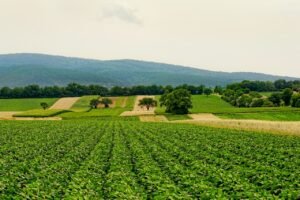
Have you ever wondered about the thriving world of urban farming in Kota Kinabalu? In this article, we will take you on a journey through the fascinating realm of urban farming in this vibrant city. From rooftop gardens to community-supported agriculture, we will explore the innovative techniques and passionate individuals who are cultivating a sustainable and green future for Kota Kinabalu. Get ready to discover the hidden gems of urban farming and how they are transforming the landscape of this bustling city. So, put on your gardening gloves and let’s dive into the captivating world of urban farming in Kota Kinabalu!

1. The Importance of Urban Farming
Urban farming is becoming increasingly important in cities around the world, and Kota Kinabalu is no exception. As the urban population continues to rise, the need for sustainable and locally sourced food becomes crucial. By engaging in urban farming practices, cities can reduce their reliance on food imports, minimize their carbon footprint, and promote food security and self-sufficiency for their residents.
1.1 Increasing urban population
With the rapid urbanization of Kota Kinabalu, the city’s population has been steadily increasing. This population growth puts a strain on the existing food supply chain, making it more challenging to provide fresh and healthy produce to all residents. Urban farming helps address this issue by bringing agriculture closer to where people live, reducing the distance food needs to travel from farm to plate.
1.2 Reducing food miles and carbon footprint
By cultivating food within the city limits, urban farming greatly reduces the number of miles that food needs to travel. This not only reduces transportation costs but also decreases the carbon footprint associated with food production and distribution. With climate change becoming an increasing concern, urban farming offers a sustainable solution that helps mitigate the environmental impact of conventional agriculture.
1.3 Promoting food security and self-sufficiency
One of the significant advantages of urban farming is its contribution to food security and self-sufficiency. By growing food locally, cities like Kota Kinabalu can decrease their reliance on external food sources that are susceptible to disruptions such as extreme weather events or transportation issues. Urban farming ensures a more consistent and reliable food supply, making it an essential component of a resilient and sustainable urban environment.
2. Urban Farming Initiatives in Kota Kinabalu
Kota Kinabalu has embraced various urban farming initiatives to harness the benefits of locally grown produce. These initiatives are diverse in their approach and cater to different urban farming needs within the city.
2.1 Rooftop Gardens
Rooftop gardens have gained popularity in Kota Kinabalu due to their efficient use of space. By transforming rooftops into green spaces, urban farmers can cultivate a variety of crops, including fruits, vegetables, and herbs. Rooftop gardens not only provide an additional food source but also contribute to improving the overall urban environment and reducing the heat island effect.
2.2 Vertical Farming
Vertical farming is another innovative approach to maximize limited space and optimize crop yields. This method involves growing plants vertically, often in tall structures or stacked layers. In Kota Kinabalu, vertical farming systems can be found both indoors and outdoors, taking advantage of unused walls, balconies, and vacant lots. Vertical farming enables farmers to grow a significant amount of food in a small footprint, making it ideal for urban environments.
2.3 Community Gardens
Community gardens play a crucial role in fostering a sense of community and empowerment among urban residents. These shared spaces allow individuals to come together, share knowledge and resources, and cultivate their own food. Kota Kinabalu has seen the establishment of various community gardens, providing a space for people to connect with nature, learn about sustainable farming practices, and produce their own food.
2.4 Aquaponics
Aquaponics combines aquaculture (raising fish) and hydroponics (growing plants without soil) to create a symbiotic system. This method utilizes the waste produced by fish as a nutrient source for the plants, while the plants filter the water for the fish. Aquaponics systems have gained traction in Kota Kinabalu as a space-efficient and resource-conscious way of growing both fish and vegetables. This integrated approach minimizes water usage and creates a closed-loop system, making it highly sustainable.
2.5 Urban Farms and Microgreens
Urban farms and microgreens have become popular choices for urban farmers in Kota Kinabalu. Urban farms offer larger-scale production of various crops, utilizing both outdoor and indoor spaces. Microgreens, on the other hand, involve growing young and nutrient-dense plants that are harvested at an early stage. Both urban farms and microgreens provide opportunities for commercial farming and contribute to the local food supply chain.

3. Benefits of Urban Farming in Kota Kinabalu
The adoption of urban farming practices in Kota Kinabalu brings forth numerous benefits to the environment, health, economy, and society. These benefits span across multiple aspects of urban life, making it a valuable and worthwhile endeavor.
3.1 Environmental Benefits
Urban farming significantly reduces the environmental impact associated with food production and distribution. By growing food locally, cities like Kota Kinabalu diminish the need for long-distance transportation, consequently reducing carbon emissions. Furthermore, sustainable farming practices adopted in urban farming, such as organic cultivation, vertical farming, and aquaponics, minimize the use of harmful chemicals and conserve water resources.
3.2 Health and Nutritional Benefits
Access to fresh, locally grown produce is essential for maintaining a healthy diet. Urban farming ensures that residents of Kota Kinabalu have access to nutritious fruits, vegetables, and herbs, reducing their reliance on processed and imported foods. By cultivating food within the city limits, urban farmers can harvest crops at their peak freshness, ensuring maximum nutritional value. Additionally, participating in urban farming promotes physical activity and outdoor engagement, contributing to improved overall health and well-being.
3.3 Economic Benefits
Urban farming has the potential to stimulate the local economy by creating job opportunities and supporting small-scale businesses. As the demand for locally sourced produce increases, urban farmers can supply markets, restaurants, and hotels with fresh and high-quality food. The revenue generated from these urban farming activities circulates within the community, fostering economic growth and resilience.
3.4 Social Benefits
Urban farming initiatives promote social cohesion, community engagement, and knowledge-sharing among residents. Community gardens and urban farms provide spaces where individuals can come together, share their gardening expertise, and learn from one another. These initiatives also enhance food literacy by educating residents about sustainable farming practices, nutrition, and the importance of supporting local farmers. By bringing people closer to the food they consume, urban farming strengthens the community’s connection to nature and the environment.
4. Challenges and Limitations of Urban Farming in Kota Kinabalu
While urban farming in Kota Kinabalu offers numerous benefits, it also faces several challenges and limitations that need to be addressed for its widespread adoption and success.
4.1 Limited Space and Land Availability
One of the primary challenges facing urban farming in Kota Kinabalu is the limited availability of space. The rapid urbanization of the city has resulted in an increased demand for housing and infrastructure, leaving little room for agriculture. As a result, urban farmers must find innovative ways to utilize available spaces, such as rooftops, vertical structures, and unused lands.
4.2 Water and Resource Constraints
Urban farming requires adequate access to water resources, which can be limited in an urban environment like Kota Kinabalu. Additionally, the availability of other essential resources, such as fertile soil and organic fertilizers, might pose challenges. Urban farmers need to adopt water-efficient irrigation systems, explore rainwater harvesting techniques, and implement sustainable farming practices to minimize resource constraints.
4.3 Lack of Public Awareness and Support
Although urban farming initiatives are gaining traction in Kota Kinabalu, there is still a considerable lack of public awareness and support. Many residents may not fully understand the benefits of urban farming or may be unaware of the opportunities available to participate in such initiatives. Education and outreach programs are crucial in raising awareness and encouraging the community to embrace urban farming practices.
4.4 Policy and Regulatory Barriers
Kota Kinabalu needs to establish supportive policies and regulations to facilitate the growth of urban farming. Guidelines for land use, zoning, and permitting should be developed to ensure urban farmers have clear pathways to establish and operate their farms. On a larger scale, the government can provide incentives and grants to encourage more individuals and organizations to engage in urban farming activities.

5. Success Stories of Urban Farming in Kota Kinabalu
Despite the challenges, Kota Kinabalu has witnessed several successful urban farming initiatives that serve as inspiring examples for the community.
5.1 Pusat Urban Farming Kota Kinabalu
Pusat Urban Farming Kota Kinabalu is a community-based urban farming initiative that promotes sustainable agriculture practices, food security, and economic empowerment. It provides training and support to individuals interested in urban farming, helping them establish their own gardens and farms. Through their workshops, Pusat Urban Farming Kota Kinabalu has empowered local residents to grow their own food and contribute to the local food supply.
5.2 Kebun Madu Kota Kinabalu
Kebun Madu Kota Kinabalu is an urban farm specializing in honey production. Located on the outskirts of the city, this farm utilizes urban farming techniques to cultivate various nectar-producing plants and maintain beehives. The farm not only provides a local source of high-quality honey but also plays a crucial role in pollination, contributing to biodiversity and ecosystem health in the surrounding area.
5.3 Green Haven Community Garden
The Green Haven Community Garden is a vibrant space located in the heart of Kota Kinabalu where residents can come together to cultivate their own plots. This community garden serves as a model for sustainable urban agriculture, showcasing various techniques such as composting, organic gardening, and rainwater harvesting. The Green Haven Community Garden fosters a strong sense of community and provides a safe and inclusive space for urban farming enthusiasts to connect and learn from one another.
6. Future Directions and Potential of Urban Farming in Kota Kinabalu
As urban farming continues to gain momentum in Kota Kinabalu, several future directions and potential opportunities can further enhance its impact and sustainability.
6.1 Integration of Smart Farming Technologies
The integration of smart farming technologies, such as sensor-based irrigation systems, automated nutrient delivery, and data-driven farming practices, can significantly enhance the efficiency and productivity of urban farms in Kota Kinabalu. These technologies enable precise control and monitoring of farming parameters, leading to optimal resource utilization and crop growth.
6.2 Collaboration with Local Restaurants and Hotels
Collaboration between urban farmers and local restaurants and hotels can create a mutually beneficial partnership that promotes the consumption of locally grown produce. Through direct sourcing agreements, urban farmers can supply fresh and high-quality ingredients to these establishments, reducing the reliance on imported and processed foods. This collaboration can also raise awareness among consumers about the benefits of supporting local farmers and sustainable food systems.
6.3 Education and Training Programs
Investing in education and training programs focused on urban farming can empower more individuals in Kota Kinabalu to participate in and contribute to the local food production. Workshops, seminars, and hands-on training sessions can provide aspiring urban farmers with the necessary knowledge and skills to start their own farms successfully. These programs can also educate the broader community on sustainable farming practices and the importance of urban farming for food security and environmental sustainability.
6.4 Government Support and Incentives
To further promote urban farming in Kota Kinabalu, the government should provide financial incentives, grants, and policy support to individuals and organizations engaged in urban farming activities. This support can encourage more people to explore urban farming as a viable livelihood option and enhance the overall sustainability of the urban food system. Additionally, the government can establish urban farming regulations and guidelines to ensure the proper implementation and management of such initiatives.
In conclusion, urban farming plays a vital role in addressing the challenges of a growing urban population, reducing food miles and carbon footprint, and promoting food security and self-sufficiency. In Kota Kinabalu, various urban farming initiatives have emerged, ranging from rooftop gardens to aquaponics systems. These initiatives offer numerous benefits, including environmental sustainability, improved health and nutrition, economic growth, and strengthened community connections. However, urban farming in Kota Kinabalu still faces challenges such as limited space, resource constraints, lack of public awareness, and policy barriers. Successful urban farming stories in Kota Kinabalu, such as Pusat Urban Farming Kota Kinabalu, Kebun Madu Kota Kinabalu, and Green Haven Community Garden, serve as inspiration for the community. Looking ahead, integrating smart farming technologies, collaborating with local businesses, promoting education and training programs, and providing government support are crucial for the future development and potential of urban farming in Kota Kinabalu. By embracing urban farming practices, Kota Kinabalu can create a more resilient, sustainable, and food-secure city for its residents.







